
views
- Self-confidence is about believing in yourself, while self-esteem is about valuing yourself.
- If you have low self-confidence, you have a hard time accepting your abilities and may struggle in social situations.
- If you have low self-esteem, you’re your worst inner critic and often doubt yourself, leading to poor body image and/or procrastination.
What is self-confidence?

Self-confidence is believing in your own abilities. When you’re self-confident, you have a strong belief in your abilities and motivations. This feeling can change in every situation. You may be confident and self-assured in one instant but not another. For instance, if you have high self-confidence, you believe you can do anything you set your mind to. Perhaps that’s asking someone to prom, performing at the talent show, or asking for a raise.
What is self-esteem?

Self-esteem is how much you value yourself. Having high self-esteem is dependent on your appreciation for yourself and your abilities. Basically, it’s how you view or perceive yourself. This develops over time and can change based on life experiences and social interactions. For example, you think about yourself positively if you have high self-esteem. This may look like dressing in clothes you enjoy despite what people may say or asking for help with a math problem in class. In these instances, you view yourself positively enough to embrace your own style and admit when you need a little help.
What happens when you have low self-esteem or self-confidence?

You’re shy. Low self-esteem and/or self-confidence can make you timid around other people. Because you don’t believe in yourself, it’s harder to stand up for yourself. This often stems from self-doubt and feeling inferior or passive.

You have trouble communicating. If you don’t think your opinion matters, why bother trying? It may be difficult for you to express your emotions or opinions if you have low self-confidence or self-esteem.
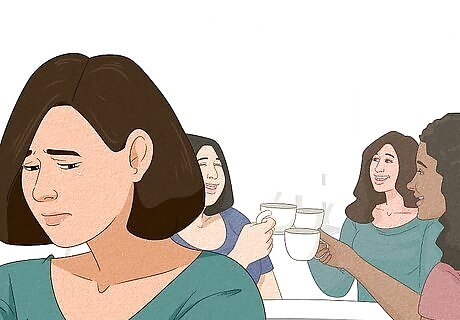
You deal with social anxiety. Crowds and public places can make you anxious when you have low self-confidence and/or self-esteem. Perhaps you think people are constantly judging you, or you’re nervous about something going wrong outside the house. Low self-esteem can go beyond this in extreme cases and cause eating disorders, depression, and other anxiety-focused phobias.

You doubt yourself. When you have low self-esteem or self-confidence, you’ll often find yourself in a negative thinking pattern. You constantly think you’re “not good enough” and don’t believe in yourself. This often leads to procrastination and even poor body image. In extreme cases, low self-esteem can result in persistent suicidal thoughts. If you experience this, reach out to a therapist or trusted loved one right away.
What causes low self-esteem or self-confidence?
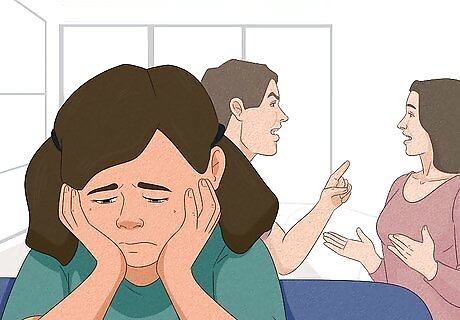
Trauma and/or hardships can cause low self-esteem or self-confidence. Feeling down about yourself can stem from many things. All in all, repetitive trauma or abuse can lower your self-confidence and self-esteem. For instance, these experiences may contribute to a critical inner voice or self-deprecating behavior: Childhood neglect Being bullied Experiencing prejudice or discrimination Losing a job Failing a test Breaking up with a partner Struggling with weight gain or loss Feeling pressure to meet expectations
How to Build Self-Esteem & Self-Confidence
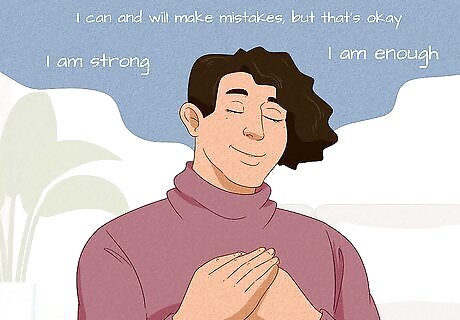
Be kind to yourself. Self-acceptance is a huge part of learning to believe in yourself. It’s okay to make mistakes—you’re only human. Think of each mistake as a lesson you can learn from, not something you should dwell on. Then, be gracious to yourself, no matter the outcome. Try saying affirmations to yourself in the mirror every morning. For example, a simple “I am strong” or “I can and will make mistakes, but that’s okay” can boost your confidence. Write a list of things you like about yourself. Then, when you feel low, pull out the list to remember just how incredible you are. Reward yourself when you do something right, but don’t punish yourself when you don’t. It’s okay to critique yourself; just avoid tearing yourself down. Love yourself. It isn’t just taking a bubble bath or buying gifts for yourself. It is a fundamental inner, meaning that you feel love for the amazing human being you are, and that you live your life as a hero of your story. Self-love is comprehensive and means accepting and loving your body, personality and life completely, including the things that you don’t like that much.
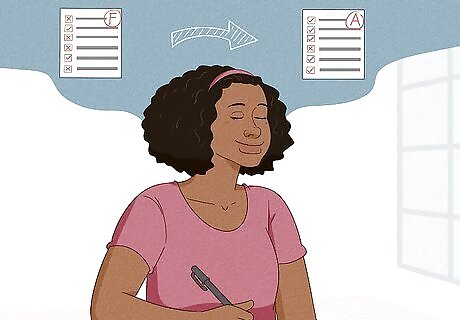
Reframe negative thoughts. Think about how you talk to yourself—is this how you would talk to a friend? If not, work on stopping those negative thoughts by replacing them with something positive. Instead of saying, “I only passed the test because it was easy,” try, “I passed the test because I studied hard and am a smart person.” Rather than, “I don’t deserve happiness,” say, “Today was a tough day, and I made mistakes, but I am still worthy of love and happiness.”

Be assertive. Start saying “no” more often and putting your own needs first. No, it’s not selfish—you’re protecting yourself and your energy! Learning to stand up for yourself in any given situation is an excellent way to build self-confidence. Keep a journal to help navigate your thoughts and be more assertive. Write about a situation where you felt shy or lacking, then identify your emotions in that moment. Reread what you wrote—how could you have made your feelings known respectfully?
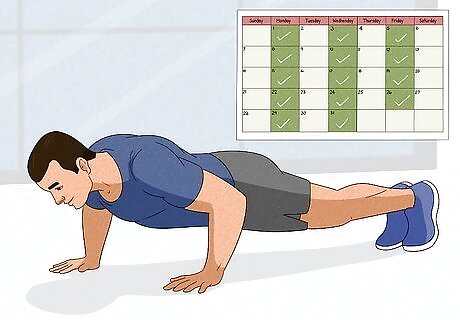
Make attainable goals. Simple changes to your lifestyle can make a big impact on your self-worth. Identify what you want in life. Then, break down your goals into specific steps on how you can achieve them. As you complete each step toward your big goal, your self-confidence will rise. Write down your goals and cross them out each time you achieve them. This way, you can visually see the progress you’ve made. Your goals don’t have to be grand like “Climb Mt. Everest.” Keep it simple at first with something like, “Exercise 3 times a week” or “Make my bed every day.”

Surround yourself with positive people. Believe it or not, one of the best things you can do to boost your self-esteem is to be around those who make you happy. Hang out with friends you trust wholeheartedly and appreciate you as you are. If they can love you unconditionally, why can’t you? Along with this, accept compliments from others. Push aside the thought that they’re only complimenting you to “be nice.” Someone thinks you’re amazing, and you totally are!
Can you have one without the other?

Yes, you can be confident but have low self-esteem. While self-confidence and self-esteem can work hand-in-hand, they’re not dependent on one another. You can strongly believe in your abilities (self-confidence) but still harshly judge yourself (self-esteem), and vice versa.



















Comments
0 comment